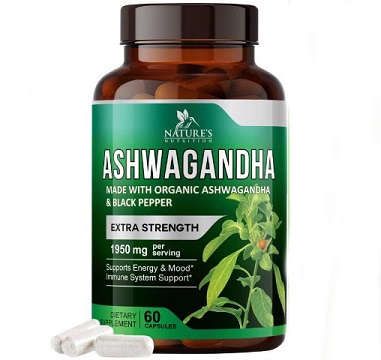Herbal supplements show promise in reducing inflammation and improving metabolic health
Nikhil Prasad Fact checked by:Thailand Medical News Team Jul 19, 2024 9 months, 1 week, 10 hours, 18 minutes ago
Supplements: New research from the University of Exeter has shown that two popular herbal supplements, Andrographis and Ashwagandha, can significantly affect inflammation and metabolism at the tissue level. This
Supplements report delves into the exciting findings and what they could mean for future health treatments.
 Herbal supplements show promise in reducing inflammation and improving metabolic health
Overview of the Study
Herbal supplements show promise in reducing inflammation and improving metabolic health
Overview of the Study
A team of researchers, including Celeste Lugtmeijer, Joanna L. Bowtell, and Mary O’Leary from the Faculty of Health and Life Sciences, Department of Public Health and Sport Sciences at the University of Exeter-UK, conducted a groundbreaking investigation. This study explored the effects of Andrographis and Ashwagandha metabolites on metabolic and inflammatory gene expression in skeletal muscle and adipose (fat) tissue. The findings offer new insights into the potential health benefits of these ancient herbs.
The Experiment Setup
The researchers recruited twenty healthy participants under 40 years old, each with a body mass index (BMI) of less than 25 kg/m². Participants were divided into two groups, with one group supplementing their diet with 2000 mg/day of Andrographis and the other with 1100 mg/day of Ashwagandha for 28 days.
Blood samples were collected before and after the supplementation period. The collected serum was then applied to cultured adipose tissue and skeletal muscle cells to observe changes in gene expression. The aim was to determine how these herbal supplements could influence inflammation and metabolism at the tissue level.
Key Findings: Andrographis
Reduced Inflammation
Andrographis supplementation led to a significant decrease in the expression of IL18 and SERPINA3 in adipose tissue. IL18 is a pro-inflammatory cytokine linked to obesity and metabolic diseases such as type 2 diabetes and cardiovascular disease. Lower levels of IL18 suggest that Andrographis may help reduce inflammation, a key factor in many chronic diseases.
Potential Metabolic Benefits
SERPINA3, a protein involved in inflammation and insulin resistance, was also found to be significantly reduced. This indicates that Andrographis might help improve insulin sensitivity and reduce the risk of metabolic disorders.
Key Findings: Ashwagandha
Impact on Fat Metabolism
Ashwagandha supplementation resulted in a marked reduction in the expression of several genes involved in fatty acid uptake and metabolism (CD36, FABP4, CPT1B, CPT2) and glucose metabolism (GSK3A, NAMPT). These changes suggest that Ashwagandha could play a role in improving metabolic health by modulating how the body processes fats and sugars.
Anti-inflammatory Effects
The study also found that Ashwagandha reduced the expression of pro-inflammatory
genes (CCL5, IL6) and increased the expression of anti-inflammatory genes (IL10, UCP2, GPX3, GPX4). This dual effect could make Ashwagandha a valuable supplement for managing chronic inflammation, a common issue in many metabolic disorders.
Enhanced Antioxidant Defense
Interestingly, while some antioxidant genes were downregulated (NFEL2, GPX4), this may indicate a reduced need for antioxidant defense due to the overall lower inflammatory environment created by Ashwagandha supplementation.
Implications for Health and Future Research
The results of this study highlight the potential of Andrographis and Ashwagandha as natural supplements to combat inflammation and metabolic disorders. By influencing gene expression in adipose and skeletal muscle tissues, these herbs could help manage and possibly prevent conditions like obesity, diabetes, and cardiovascular diseases.
More Human Trials Needed
While the findings are promising, the study's authors note that further research, especially clinical trials involving individuals with metabolic disorders, is necessary to fully understand the potential benefits and mechanisms of these supplements.
Safety and Dosage
The study used dosages based on existing literature and manufacturer recommendations, but it is crucial for future studies to establish optimal dosages and long-term safety profiles for these supplements.
Conclusion
This pioneering research by the University of Exeter team opens new doors for using natural supplements in managing inflammation and metabolic health.
The findings were published in the peer-reviewed journal Nutrients, emphasizing the rigorous scientific approach taken by the researchers.
https://www.mdpi.com/2072-6643/16/14/2291
For the latest on
Supplements, keep logging into Thailand Medical News.
Read Also:
https://www.thailandmedical.news/news/must-read-covid-19-treatment-calls-for-research-into-sod-3,-artemisia-annua-and-ashwagandha-as-possible-adjuvant-drugs-for-covid-19
https://www.thailandmedical.news/news/herbs-and-phytochemicals-dendrobium-lindleyi-steud--phytochemical-profile,-antioxidant-potency,-anti-inflammatory-effects-and-thrombolytic-activity
